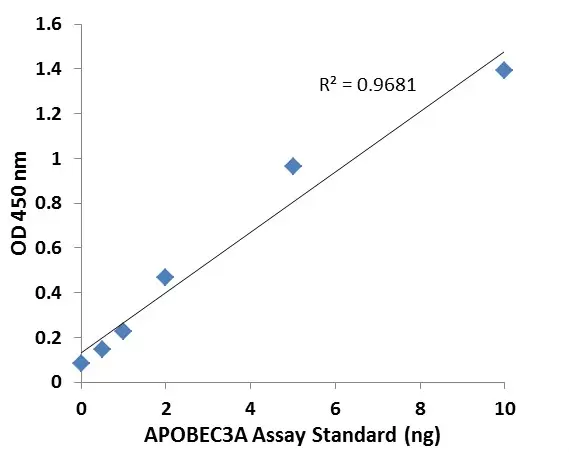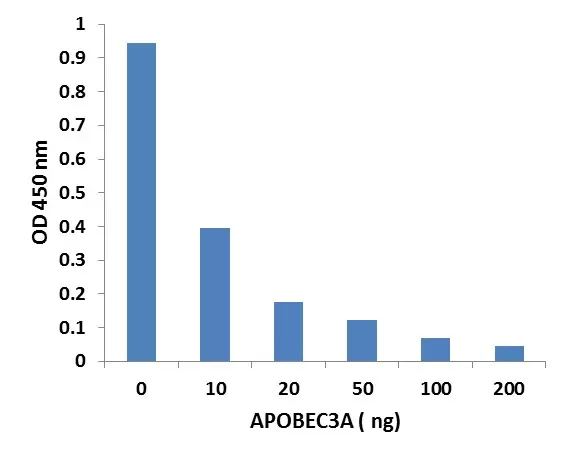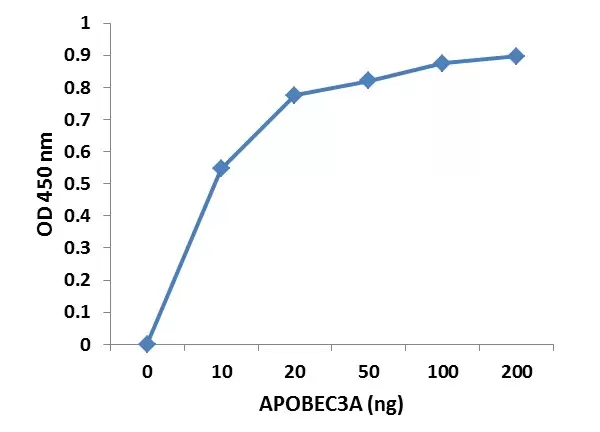Epigenase APOBEC3A Activity/Inhibition Assay Kit
Product Description
The Epigenase™ APOBEC3A Activity/Inhibition Assay Kit is a complete set of optimized buffers and reagents for measuring the activity/inhibition of APOBC3A enzyme using cell extracts or purified APOBEC3A from human and other mammals, in a variety of forms including, but not limited to cultured cells, fresh and frozen tissues. The kit has the following advantages and features:
- Colorimetric assay with easy-to-follow steps that can be finished within 5 hours
- Innovative kit composition enables background signals to be extremely low, allowing the assay to be simple, accurate, reliable, and consistent
- Both cell/tissue extracts and purified APOBEC3A enzymes can be used for detecting APOBEC3A inhibitor effects in vivo and in vitro
- Novel assay principle allows for high sensitivity with a detection limit as low as 10 ng of purified APOBEC3A enzymes
- The assay standard is included for quantifying the specific activity of APOBEC3A
- Strip microplate format for manual or high throughput analysis
Background Information
The APOBEC3A cytosine deaminase (Apolipoprotein B mRNA-editing enzyme catalytic polypeptide 3A) is a DNA/RNA editing enzyme. APOBEC3A is found exclusively in mammals and can catalyze the removal of an amino group from the cytosine (C) and 5-methylcytosine (5-mC) base to form uridine (U) and thymidine, respectively, in single-strand DNA or RNA. The genetic alterations by APOBEC3A will change the transcription and mRNA processing and actively participate in various biological processes. APOBEC3A is a part of the innate immune system against various DNA or RNA viruses to protect the integrity of cells. Through promoting the deamination of cytosine to uracil on ssDNA/RNA, APOBEC3A generates mutations in virus genomes to inhibit virus replication. For example, a C-to-U mutation caused by APOBEC3s in SARS-CoV-2 genomes was reported to be the dominant mutation (>50%). APOBEC3A was also found to be among the most abundant mRNA in COVID-19 patients, which probably inhibits SARS-CoV-2 replication through damaging the virus-repairing enzyme nsp14. While APOBEC3A confers its intrinsic host resistance to infection of various viruses, including the SARS-CoV-2 virus, it may also cause potential evolutionary consequences for viruses. APOBEC3A contributes significantly to DNA mutagenesis in cancer. As a major driver of cancer evolution, APOBEC3A plays an important role in genomic mutations detected in a variety of tumors. APOBEC3 mutation signatures can be seen in more than 50% of various cancers, promoting carcinogenesis that furthers cancer progression and resistance to therapies. In addition, APOBEC3A is the only APOBEC3 enzyme that can efficiently deaminate 5-methylcytidine to thymidine. It participates (alone or combined with methylated DNA/RNA oxidative enzymes such as TETs) in local DNA demethylation to support epigenetic cellular identity and regulation.
Principle & Procedure
This kit is designed for measuring APOBEC3A activity/inhibition. In an assay with this kit, the unique 5mC substrate is stably coated on the strip wells. Active APOBEC3A binds to and converts 5mC contained in the substrate to T. The un-converted 5mC in the substrate can be recognized with a high-affinity 5mC antibody, and the immuno-signal is improved with enhancer solution. The ratio or amount of un-converted 5mC, which is inversely proportional to enzyme activity, can then be colorimetrically quantified through an ELISA-like reaction.
Performance Data

Fig 1. Illustrated standard curve generated with the APOBEC3A assay standard.

Fig 2. APOBEC3A activity achieved by using recombinant APOBEC3A with the Epigenase™ APOBEC3A Activity/Inhibition Assay Kit. Recombinant human APOBEC3A enzyme was added at different concentrations. OD is inversely proportional to APOBEC3A enzyme activity.

Fig 3. Converted OD from raw OD data shown in Fig 2.
- Catalog Number
P-3142-96-EP - Supplier
EpigenTek - Size
- Shipping
Blue Ice

